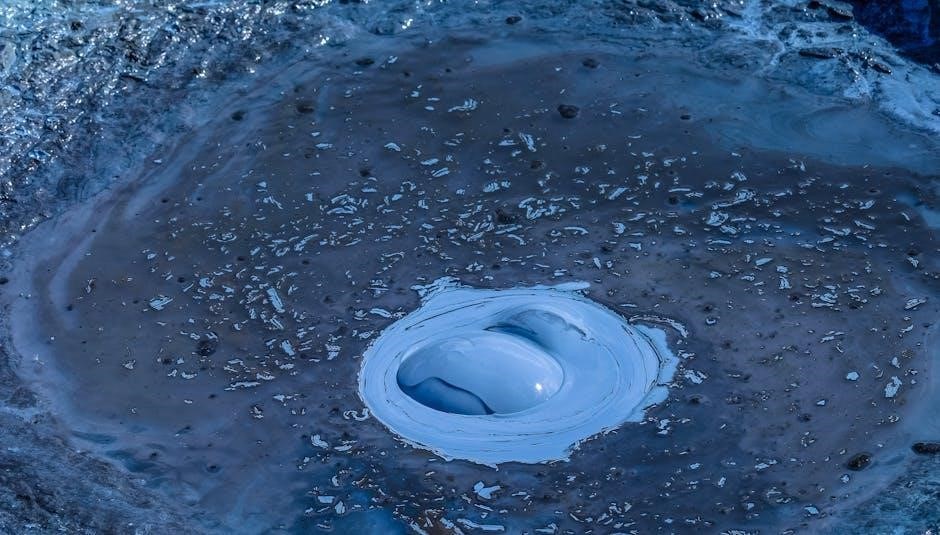Pool chemistry for dummies pdf guides beginners in understanding essential pool water chemistry. Learn about chlorine, pH, stabilizers, and other chemicals to maintain a safe, clean pool. Regular testing ensures optimal water balance for swimmer health and system efficiency. Proper chemical levels prevent algae growth and cloudy water, ensuring your pool stays inviting year-round. Start with stabilized chlorine for outdoor pools and balance pH levels between 7.2-7.8 for sanitizer effectiveness. Shock your pool when needed to eliminate contaminants; Testing twice weekly during swimming season keeps your pool chemistry in check. Download a pool chemistry cheat sheet for quick reference to key chemical levels and maintenance tips. Balancing pool chemistry is crucial for preventing eye irritation, protecting equipment, and maintaining clear water. Use test strips or kits to monitor pH, chlorine, alkalinity, and calcium hardness. Adjust levels as needed to keep your pool safe and enjoyable. Prevent stains and corrosion by maintaining proper sanitizer levels and avoiding extreme pH fluctuations. For advanced care, consider saltwater chlorine generators or bromine as alternatives to traditional chlorine. Always follow manufacturer instructions for chemical additions and test regularly to avoid imbalances. Pool chemistry for dummies pdf simplifies maintenance, helping you master the basics and keep your pool pristine.
1.1 Understanding the Basics of Pool Water Chemistry

Pool water chemistry involves maintaining proper chemical levels to ensure a safe and clean swimming environment. The primary elements to monitor are chlorine, pH, alkalinity, and stabilizers. Chlorine acts as a sanitizer, while pH levels affect its efficiency. Alkalinity stabilizes pH, and stabilizers like cyanuric acid protect chlorine from sunlight. Regular testing (twice weekly for pH and chlorine, weekly for alkalinity) is essential. Monthly checks for calcium hardness prevent damage. Keeping these levels balanced prevents algae growth, cloudy water, and equipment corrosion, ensuring a healthy and enjoyable pool experience. Proper pool chemistry also avoids eye irritation and skin discomfort, making it vital for swimmer safety. By understanding these basics, you can maintain optimal water quality effortlessly. Regular adjustments and testing are key to mastering pool chemistry for dummies. Always keep a record of your tests to track consistency and identify trends. This helps in making informed decisions for chemical adjustments. Balancing these elements ensures your pool remains clear, safe, and inviting all season long;

1.2 Importance of Maintaining Proper Pool Chemistry

Maintaining proper pool chemistry ensures a safe, clean, and healthy swimming environment. Imbalanced levels can lead to eye irritation, skin discomfort, and respiratory issues. Proper chlorine and pH levels prevent algae growth and cloudy water, reducing maintenance costs. Balanced chemistry also protects pool equipment from corrosion, extending its lifespan. Regular testing and adjustments prevent contamination, ensuring your pool remains inviting and safe for everyone. Proper pool chemistry is essential for swimmer health and equipment longevity, making it a priority for all pool owners. By following the guidelines in a pool chemistry for dummies pdf, you can avoid common issues and enjoy a hassle-free pool experience. Regular maintenance ensures optimal water quality, preventing unexpected problems and keeping your pool in pristine condition. This dedication to proper chemistry not only enhances safety but also boosts the overall enjoyment of your swimming pool. Consistent monitoring and adjustments are key to maintaining a perfect balance, ensuring your pool remains a refreshing oasis all season long.

Essential Pool Chemicals

Essential pool chemicals include chlorine, pH balancers, stabilizers, and shock treatments. These prevent contamination, maintain clarity, and ensure a safe swimming environment. Regular use keeps water clean.
2.1 Chlorine: The Primary Sanitizer

Chlorine is the most common pool sanitizer, available in stabilized or unstabilized forms. Stabilized chlorine, containing cyanuric acid, protects chlorine from sunlight, making it ideal for outdoor pools. It disinfects water, kills bacteria, and prevents algae growth. Proper levels ensure effective sanitation and swimmer safety. Test chlorine levels regularly to maintain a range of 1-3 ppm for optimal performance. Adjust as needed to keep your pool clean and safe. Regular monitoring prevents imbalances that can lead to contamination or eye irritation. Chlorine is essential for maintaining clear, healthy water, making it a cornerstone of pool chemistry for dummies. Proper use ensures efficiency and effectiveness. Always follow guidelines for application and testing to maintain ideal levels. This ensures your pool remains safe and enjoyable for everyone. Chlorine’s role is vital, so understanding its use is key to proper pool maintenance. Stabilized chlorine lasts longer, reducing frequent adjustments. This makes it a practical choice for consistent pool care. Balancing chlorine levels with other chemicals ensures overall water harmony. Without chlorine, your pool can become a breeding ground for harmful organisms. Thus, it’s crucial to manage chlorine levels diligently. By doing so, you protect the health of swimmers and the longevity of your pool equipment. Chlorine is a simple yet effective solution for maintaining a clean and safe pool environment. Its proper use is fundamental in pool chemistry for dummies, ensuring your pool stays pristine and inviting. Regular testing and adjustments are necessary to maintain optimal chlorine levels, preventing potential issues like cloudy water or algae growth. Chlorine remains the go-to sanitizer for pool owners, offering reliability and effectiveness when used correctly. It’s a must-have chemical for any pool care routine, as outlined in pool chemistry for dummies guides. Understanding chlorine’s role and proper application is essential for maintaining a healthy and safe pool. Always prioritize chlorine management to enjoy a clean swimming experience. Chlorine is a key component in achieving and maintaining balanced pool chemistry, ensuring your pool is always ready for use. Proper chlorine levels prevent contamination and keep your pool water clear and safe. Regular monitoring and adjustments are vital to uphold these standards. Chlorine is the primary sanitizer in pool chemistry, making it indispensable for pool maintenance. Its effectiveness depends on correct usage and consistent testing. By following pool chemistry for dummies guidelines, you can master chlorine management and keep your pool in top condition. Chlorine is a fundamental element in pool care, providing essential sanitation and protection against harmful organisms. Its proper application and maintenance are crucial for a safe and enjoyable swimming environment. Always refer to pool chemistry for dummies resources for guidance on chlorine use and testing. Chlorine is the backbone of pool sanitation, ensuring your pool remains clean and free from contaminants. Regular testing and adjustments maintain optimal levels, preventing issues like algae growth or cloudy water. Chlorine’s effectiveness is enhanced when used alongside other chemicals like stabilizers, as recommended in pool chemistry guides. Proper chlorine management is essential for maintaining a healthy and inviting pool. By adhering to pool chemistry for dummies advice, you can ensure your pool is always safe and clean. Chlorine is a simple yet crucial chemical for pool maintenance, offering effective sanitation when used correctly. Regular testing and adjustments are necessary to maintain optimal levels and prevent potential problems. Chlorine remains the primary sanitizer in pool chemistry, providing reliable protection against bacteria and algae. Its proper use is fundamental for maintaining a clean and safe pool environment. Always follow pool chemistry for dummies guidelines for effective chlorine management. Chlorine is essential for maintaining clean and safe pool water, making it a must-have chemical for any pool owner. Proper use and regular testing ensure optimal levels, preventing contamination and ensuring swimmer health. Chlorine is a key component in pool chemistry, providing effective sanitation and protection against harmful organisms. Its proper application and maintenance are vital for a safe and enjoyable swimming experience. By following pool chemistry for dummies advice, you can master chlorine management and keep your pool in pristine condition. Chlorine is the primary sanitizer in pool chemistry, ensuring your pool remains clean and free from contaminants. Regular testing and adjustments maintain optimal levels, preventing issues like algae growth or cloudy water. Chlorine’s effectiveness is enhanced when used alongside other chemicals like stabilizers, as recommended in pool chemistry guides. Proper chlorine management is essential for maintaining a healthy and inviting pool. By adhering to pool chemistry for dummies advice, you can ensure your pool is always safe and clean. Chlorine is a simple yet crucial chemical for pool maintenance, offering effective sanitation when used correctly. Regular testing and adjustments are necessary to maintain optimal levels and prevent potential problems. Chlorine remains the primary sanitizer in pool chemistry, providing reliable protection against bacteria and algae. Its proper use is fundamental for maintaining a clean and safe pool environment. Always follow pool chemistry for dummies guidelines for effective chlorine management. Chlorine is essential for maintaining clean and safe pool water, making it a must-have chemical for any pool owner. Proper use and regular testing ensure optimal levels, preventing contamination and ensuring swimmer health. Chlorine is a key component in pool chemistry, providing effective sanitation and protection against harmful organisms. Its proper application and maintenance are vital for a safe and enjoyable swimming experience. By following pool chemistry for dummies advice, you can master chlorine management and keep your pool in pristine condition. Chlorine is the primary sanitizer in pool chemistry, ensuring your pool remains clean and free from contaminants. Regular testing and adjustments maintain optimal levels, preventing issues like algae growth or cloudy water. Chlorine’s effectiveness is enhanced when used alongside other chemicals like stabilizers, as recommended in pool chemistry guides. Proper chlorine management is essential for maintaining a healthy and inviting pool. By adhering to pool chemistry for dummies advice, you can ensure your pool is always safe and clean. Chlorine is a simple yet crucial chemical for pool maintenance, offering effective sanitation when used correctly. Regular testing and adjustments are necessary to maintain optimal levels and prevent potential problems. Chlorine remains the primary sanitizer in pool chemistry, providing reliable protection against bacteria and algae. Its proper use is fundamental for maintaining a clean and safe pool environment. Always follow pool chemistry for dummies guidelines for effective chlorine management. Chlorine is essential for maintaining clean and safe pool water, making it a must-have chemical for any pool owner. Proper use and regular testing ensure optimal levels, preventing contamination and ensuring swimmer health. Chlorine is a key component in pool chemistry, providing effective sanitation and protection against harmful organisms. Its proper application and maintenance are vital for a safe and enjoyable swimming experience. By following pool chemistry for dummies advice, you can master chlorine management and keep your pool in pristine condition. Chlorine is the primary sanitizer in pool chemistry, ensuring your pool remains clean and free from contaminants. Regular testing and adjustments maintain optimal levels, preventing issues like algae growth or cloudy water. Chlorine’s effectiveness is enhanced when used alongside other chemicals like stabilizers, as recommended in pool chemistry guides. Proper chlorine management is essential for maintaining a healthy and inviting pool. By adhering to pool chemistry for dummies advice, you can ensure your pool is always safe and clean. Chlorine is a simple yet crucial chemical for pool maintenance, offering effective sanitation when used correctly. Regular testing and adjustments are necessary to maintain optimal levels and prevent potential problems. Chlorine remains the primary sanitizer in pool chemistry, providing reliable protection against bacteria and algae. Its proper use is fundamental for maintaining a clean and safe pool environment. Always follow pool chemistry for dummies guidelines for effective chlorine management. Chlorine is essential for maintaining clean and safe pool water, making it a must-have chemical for any pool owner. Proper use and regular testing ensure optimal levels, preventing contamination and ensuring swimmer health. Chlorine is a key component in pool chemistry, providing effective sanitation and protection against harmful organisms. Its proper application and maintenance are vital for a safe and enjoyable swimming experience. By following pool chemistry for dummies advice, you can master chlorine management and keep your pool in pristine condition. Chlorine is the primary sanitizer in pool chemistry, ensuring your pool remains clean and free from contaminants. Regular testing and adjustments maintain optimal levels, preventing issues like algae growth or cloudy water. Chlorine’s effectiveness is enhanced when used alongside other chemicals like stabilizers, as recommended in pool chemistry guides. Proper chlorine management is essential for maintaining a healthy and inviting pool. By adhering to pool chemistry for dummies advice, you can ensure your pool is always safe and clean. Chlorine is a simple yet crucial chemical for pool maintenance, offering effective sanitation when used correctly. Regular testing and adjustments are necessary to maintain optimal levels and prevent potential problems. Chlorine remains the primary sanitizer in pool chemistry, providing reliable protection against bacteria and algae. Its proper use is fundamental for maintaining a clean and safe pool environment. Always follow pool chemistry for dummies guidelines for effective chlorine management. Chlorine is essential for maintaining clean and safe pool water, making it a must-have chemical for any pool owner. Proper use and regular testing ensure optimal levels, preventing contamination and ensuring swimmer health. Chlorine is a key component in pool chemistry, providing effective sanitation and protection against harmful organisms. Its proper application and maintenance are vital for a safe and enjoyable swimming experience. By following pool chemistry for dummies advice, you can master chlorine management and keep your pool in pristine condition. Chlorine is the primary sanitizer in pool chemistry, ensuring your pool remains clean and free from contaminants. Regular testing and adjustments maintain optimal levels, preventing issues like algae growth or cloudy water. Chlorine’s effectiveness is enhanced when used alongside other chemicals like stabilizers, as recommended in pool chemistry guides. Proper chlorine management is essential for maintaining a healthy and inviting pool. By adhering to pool chemistry for dummies advice, you can ensure your pool is always safe and clean. Chlorine is a simple yet crucial chemical for pool maintenance, offering effective sanitation when used correctly. Regular testing and adjustments are necessary to maintain optimal levels and prevent potential problems. Chlorine remains the primary sanitizer in pool chemistry, providing reliable protection against bacteria and algae. Its proper use
2.2 pH and Alkalinity: The Foundation of Pool Chemistry

pH and alkalinity are the backbone of pool chemistry. The ideal pH range is 7.2–7.8, ensuring swimmer comfort and sanitizer effectiveness. Alkalinity, measuring 80–120 ppm, stabilizes pH levels, preventing drastic fluctuations. Imbalanced pH can cause eye irritation or equipment damage, while low alkalinity leads to unstable water. Regular testing and adjustments are crucial to maintain harmony and protect your pool from potential issues. Proper pH and alkalinity levels ensure a safe, enjoyable swimming environment. Always test these levels weekly to keep your pool chemistry balanced and effective. Adjustments may be needed after heavy use or weather changes. Maintaining these levels prevents cloudiness and ensures optimal sanitizer performance. pH and alkalinity are essential for a well-maintained pool, as outlined in pool chemistry for dummies guides. Regular monitoring and adjustments are key to maintaining a healthy pool environment. Proper pH and alkalinity levels protect equipment and ensure swimmer safety. Always prioritize these measurements to keep your pool in top condition. By managing pH and alkalinity, you create a stable foundation for all other pool chemicals to function effectively. Regular testing ensures your pool remains safe and inviting for everyone. Proper pH and alkalinity levels are vital for maintaining clear, balanced water. Adjustments are necessary to prevent imbalances that can lead to cloudy water or equipment damage. Always refer to pool chemistry for dummies resources for guidance on pH and alkalinity management. Regular testing and adjustments ensure your pool remains in optimal condition. pH and alkalinity are the foundation of pool chemistry, ensuring a safe and enjoyable swimming experience. Proper levels prevent contamination and protect equipment. Always follow pool chemistry for dummies guidelines for effective management. Regular monitoring ensures your pool stays clean and safe. pH and alkalinity are the cornerstone of pool chemistry, providing a stable environment for other chemicals to work effectively. Proper levels ensure swimmer comfort and equipment longevity. Always test and adjust pH and alkalinity weekly to maintain a balanced pool. This ensures your pool remains clean, safe, and inviting for everyone. By prioritizing pH and alkalinity, you create a solid foundation for all other pool chemistry elements. Regular adjustments maintain optimal levels, preventing potential issues. Pool chemistry for dummies emphasizes the importance of pH and alkalinity for a healthy pool. Always follow these guidelines to ensure your pool is well-maintained and safe. Proper pH and alkalinity levels are essential for effective pool chemistry. Regular testing and adjustments maintain a stable environment, ensuring swimmer safety and equipment protection. Always refer to pool chemistry for dummies resources for guidance on managing these levels. Regular monitoring ensures your pool remains in top condition. pH and alkalinity are the foundation of pool chemistry, ensuring a safe and enjoyable swimming experience. Proper levels prevent contamination and protect equipment. Always follow pool chemistry for dummies guidelines for effective management. Regular monitoring ensures your pool stays clean and safe. pH and alkalinity are the cornerstone of pool chemistry, providing a stable environment for other chemicals to work effectively. Proper levels ensure swimmer comfort and equipment longevity. Always test and adjust pH and alkalinity weekly to maintain a balanced pool. This ensures your pool remains clean, safe, and inviting for everyone. By prioritizing pH and alkalinity, you create a solid foundation for all other pool chemistry elements. Regular adjustments maintain optimal levels, preventing potential issues. Pool chemistry for dummies emphasizes the importance of pH and alkalinity for a healthy pool. Always follow these guidelines to ensure your pool is well-maintained and safe. Proper pH and alkalinity levels are essential for effective pool chemistry. Regular testing and adjustments maintain a stable environment, ensuring swimmer safety and equipment protection. Always refer to pool chemistry for dummies resources for guidance on managing these levels. Regular monitoring ensures your pool remains in top condition. pH and alkalinity are the foundation of pool chemistry, ensuring a safe and enjoyable swimming experience. Proper levels prevent contamination and protect equipment. Always follow pool chemistry for dummies guidelines for effective management. Regular monitoring ensures your pool stays clean and safe. pH and alkalinity are the cornerstone of pool chemistry, providing a stable environment for other chemicals to work effectively. Proper levels ensure swimmer comfort and equipment longevity. Always test and adjust pH and alkalinity weekly to maintain a balanced pool. This ensures your pool remains clean, safe, and inviting for everyone. By prioritizing pH and alkalinity, you create a solid foundation for all other pool chemistry elements. Regular adjustments maintain optimal levels, preventing potential issues. Pool chemistry for dummies emphasizes the importance of pH
3.1 Role of Stabilizer in Protecting Chlorine

Cyanuric acid, or stabilizer, protects chlorine from sun degradation, extending its effectiveness. It ensures chlorine remains active, maintaining a clean and sanitized pool environment. Proper levels are essential for optimal performance. Always test and adjust stabilizer levels as needed to keep your pool water safe and clear. This ensures your pool remains protected and enjoyable for swimmers. Cyanuric acid is a crucial component in pool chemistry, working alongside chlorine to maintain water quality. Regular monitoring ensures its effectiveness and prevents unnecessary chemical imbalances. By maintaining proper stabilizer levels, you ensure your pool stays clean and safe. Cyanuric acid is a vital part of pool chemistry, protecting chlorine and ensuring a healthy swimming environment. Always follow pool chemistry for dummies guidelines for proper stabilizer management. Regular testing ensures your pool remains balanced and safe. Cyanuric acid plays a key role in protecting chlorine, ensuring your pool stays clean and sanitized. Proper levels are essential for maintaining a healthy swimming environment. Always refer to pool chemistry for dummies resources for guidance on stabilizer management. Regular adjustments maintain optimal levels, preventing potential issues. Cyanuric acid is a critical component in pool chemistry, protecting chlorine and ensuring a safe and enjoyable swimming experience. Always monitor and adjust stabilizer levels to keep your pool in top condition. Proper stabilizer levels ensure chlorine effectiveness, maintaining a clean and sanitized pool. Regular testing and adjustments are necessary to prevent imbalances. Cyanuric acid is essential for protecting chlorine, ensuring your pool remains clean and safe. Always follow pool chemistry for dummies guidelines for effective stabilizer management. Regular monitoring ensures your pool stays balanced and inviting for swimmers. Cyanuric acid plays a vital role in pool chemistry, protecting chlorine and maintaining water quality. Proper levels are crucial for a healthy and enjoyable swimming environment. Always test and adjust stabilizer levels as needed to keep your pool in optimal condition. Cyanuric acid is a key component in pool chemistry, ensuring chlorine remains effective. Proper levels maintain a clean and safe pool environment. Always refer to pool chemistry for dummies resources for guidance on stabilizer management. Regular adjustments prevent imbalances and ensure optimal water quality. Cyanuric acid is essential for protecting chlorine, ensuring your pool stays clean and sanitized. Proper levels maintain a healthy swimming environment. Always follow pool chemistry for dummies guidelines for effective stabilizer management. Regular monitoring ensures your pool remains in top condition. Cyanuric acid is a critical part of pool chemistry, protecting chlorine and ensuring a safe and enjoyable swimming experience. Always monitor and adjust stabilizer levels to keep your pool clean and inviting. Proper stabilizer levels ensure chlorine effectiveness, maintaining a clean and sanitized pool. Regular testing and adjustments are necessary to prevent imbalances. Cyanuric acid is essential for protecting chlorine, ensuring your pool remains clean and safe. Always follow pool chemistry for dummies guidelines for effective stabilizer management. Regular monitoring ensures your pool stays balanced and inviting for swimmers. Cyanuric acid plays a vital role in pool chemistry, protecting chlorine and maintaining water quality. Proper levels are crucial for a healthy and enjoyable swimming environment. Always test and adjust stabilizer levels as needed to keep your pool in optimal condition. Cyanuric acid is a key component in pool chemistry, ensuring chlorine remains effective. Proper levels maintain a clean and safe pool environment. Always refer to pool chemistry for dummies resources for guidance on stabilizer management. Regular adjustments prevent imbalances and ensure optimal water quality. Cyanuric acid is essential for protecting chlorine, ensuring your pool stays clean and sanitized. Proper levels maintain a healthy swimming environment. Always follow pool chemistry for dummies guidelines for effective stabilizer management. Regular monitoring ensures your pool remains in top condition. Cyanuric acid is a critical part of pool chemistry, protecting chlorine and ensuring a safe and enjoyable swimming experience. Always monitor and adjust stabilizer levels to keep your pool clean and inviting. Proper stabilizer levels ensure chlorine effectiveness, maintaining a clean and sanitized pool. Regular testing and adjustments are necessary to prevent imbalances. Cyanuric acid is essential for protecting chlorine, ensuring your pool remains clean and safe. Always follow pool chemistry for dummies guidelines for effective stabilizer management. Regular monitoring ensures your pool stays balanced and inviting for swimmers. Cyanuric acid plays a vital role in pool chemistry, protecting chlorine and maintaining water quality. Proper levels are crucial for a healthy and enjoyable swimming environment. Always test and adjust stabilizer levels as needed to keep your pool in optimal condition. Cyanuric acid is a key component in pool chemistry, ensuring chlorine remains effective. Proper levels maintain a clean and safe pool environment. Always refer to pool chemistry for dummies resources for guidance on stabilizer management. Regular adjustments prevent imbalances and ensure optimal water quality. Cyanuric acid is essential for protecting chlorine, ensuring your pool stays clean and sanitized. Proper levels maintain a healthy swimming environment. Always follow pool chemistry for dummies guidelines for effective stabilizer management. Regular monitoring ensures your pool remains in top condition. Cyanuric acid is a critical part of pool chemistry, protecting chlorine and ensuring a safe and enjoyable swimming experience. Always monitor and adjust stabilizer levels to keep your pool clean and inviting. Proper stabilizer levels ensure chlorine effectiveness, maintaining a clean and sanitized pool. Regular testing and adjustments are necessary to prevent imbalances. Cyanuric acid is essential for protecting chlorine, ensuring your pool remains clean and safe. Always follow pool chemistry for dummies guidelines for effective stabilizer management. Regular monitoring ensures your pool stays balanced and inviting for swimmers. Cyanuric acid plays a vital role in pool chemistry, protecting chlorine and maintaining water quality. Proper levels are crucial for a healthy and enjoyable swimming environment. Always test and adjust stabilizer levels as needed to keep your pool in optimal condition. Cyanuric acid is a key component in pool chemistry, ensuring chlorine remains effective. Proper levels maintain a clean and safe pool environment. Always refer to pool chemistry for dummies resources for guidance on stabilizer management. Regular adjustments prevent imbalances and ensure optimal water quality. Cyanuric acid is essential for protecting chlorine, ensuring your pool stays clean and sanitized. Proper levels maintain a healthy swimming environment. Always follow pool chemistry for dummies guidelines for effective stabilizer management. Regular monitoring ensures your pool remains in top condition. Cyanuric acid is a critical part of pool chemistry, protecting chlorine and ensuring a safe and enjoyable swimming experience. Always monitor and adjust stabilizer levels to keep your pool clean and inviting. Proper stabilizer levels ensure chlorine effectiveness, maintaining a clean and sanitized pool. Regular testing and adjustments are necessary to prevent imbalances. Cyanuric acid is essential for protecting chlorine, ensuring your pool remains clean and safe. Always follow pool chemistry for dummies guidelines for effective stabilizer management. Regular monitoring ensures your pool stays balanced and inviting for swimmers. Cyanuric acid plays a vital role in pool chemistry, protecting chlorine and maintaining water quality. Proper levels are crucial for a healthy and enjoyable swimming environment. Always test and adjust stabilizer levels as needed to keep your pool in optimal condition. Cyanuric acid is a key component in pool chemistry, ensuring chlorine remains effective. Proper levels maintain a clean and safe pool environment. Always refer to pool chemistry for dummies resources for guidance on stabilizer management. Regular adjustments prevent imbalances and ensure optimal water quality. Cyanuric acid is essential for protecting chlorine, ensuring your pool stays clean and sanitized. Proper levels maintain a healthy swimming environment. Always follow pool chemistry for dummies guidelines for effective stabilizer management. Regular monitoring ensures your pool remains in top condition. Cyanuric acid is a critical part of pool chemistry, protecting chlorine and ensuring a safe and enjoyable swimming experience. Always monitor and adjust stabilizer levels to keep your pool clean and inviting. Proper stabilizer levels ensure chlorine effectiveness, maintaining a clean and sanitized pool. Regular testing and adjustments are necessary to prevent imbalances. Cyanuric acid is essential for protecting chlorine, ensuring your pool remains clean and safe. Always follow pool chemistry for dummies guidelines for effective stabilizer management. Regular monitoring ensures your pool stays balanced and inviting for swimmers. Cyanuric acid plays a vital role in pool chemistry, protecting chlorine and maintaining water quality. Proper levels are crucial for a healthy and enjoyable swimming environment. Always test and adjust stabilizer levels as needed to keep your pool in optimal condition. Cyanuric acid is a key component in pool chemistry, ensuring chlorine remains effective. Proper levels maintain a clean and safe pool environment. Always refer to pool chemistry for dummies resources for guidance on stabilizer management. Regular adjustments prevent imbalances and ensure optimal water quality. Cyanuric acid is essential for protecting chlorine, ensuring your pool stays clean and sanitized. Proper levels maintain a healthy swimming environment. Always follow pool chemistry for dummies guidelines for effective stabilizer management. Regular monitoring ensures your pool remains in top condition. Cyanuric acid is a critical part of pool chemistry, protecting chlorine and ensuring a safe and enjoyable swimming experience. Always monitor and adjust stabilizer levels to keep your pool clean and inviting. Proper stabilizer levels ensure chlorine




About the author